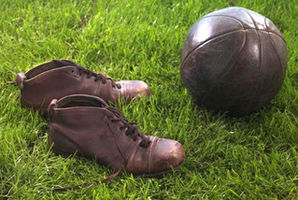 John
Bentley was born in Turton in June 1860. A keen footballer, he
became club secretary of Bolton Wanderers in 1885. John
Bentley was born in Turton in June 1860. A keen footballer, he
became club secretary of Bolton Wanderers in 1885.
On 20th July, 1885, the Football Association announced that it
was "in the interests of Association Football, to legalize the
employment of professional football players, but only under
certain restrictions". Clubs were allowed to pay players
provided that they had either been born or had lived for two
years within a six-mile radius of the ground.
The decision to pay players increased club's wage bills. It was
therefore necessary to arrange more matches that could be played
in front of large crowds. On 2nd March, 1888, William McGregor
circulated a letter to Aston Villa, Blackburn Rovers, Bolton
Wanderers, Preston North End, and West Bromwich Albion
suggesting that "ten or twelve of the most prominent clubs in
England combine to arrange home and away fixtures each season."
John Bentley of Bolton Wanderers and Tom Mitchell of Blackburn
Rovers responded very positively to the suggestion. They
suggested that other clubs should be invited to the meeting
being held on 23rd March, 1888. This included Accrington,
Burnley, Derby County, Notts County, Stoke, Wolverhampton
Wanderers, Old Carthusians, and Everton should be invited to the
meeting.
The following month the Football League was formed. It consisted
of six clubs from Lancashire (Preston North End, Accrington,
Blackburn Rovers, Burnley, Bolton Wanderers and Everton) and six
from the Midlands (Aston Villa, Derby County, Notts County,
Stoke, West Bromwich Albion and Wolverhampton Wanderers). The
main reason Sunderland was excluded was because the other clubs
in the league objected to the costs of travelling to the
North-East. McGregor also wanted to restrict the league to
twelve clubs. Therefore, the applications of Sheffield
Wednesday, Nottingham Forest, Darwen and Bootle were rejected.
In 1893 John Bentley became president of the Football League.
Bentley opposed the power of the Football Association and
objected to the decision that stated that no transfer fee of
more than £10 be paid by football clubs. As Bentley pointed out
in 1899: "The serious battle will be fought on what the League
considers a principle and that is being allowed to work its own
particular competition in its own particular way whilst at the
same time observing the rules of the parent body."
In 1902 Newton Heath was £2,670 in debt and faced a winding-up
order. At a shareholders' meeting in the New Islington Hall,
Harry Stafford announced that he and four local businessmen,
including John Henry Davies, were willing to takeover the club's
debts. The Football League approved the plan and Newton Heath
now became Manchester United. Davies arranged for J.J. Bentley
to be appointed as president of the club. |
|
|


